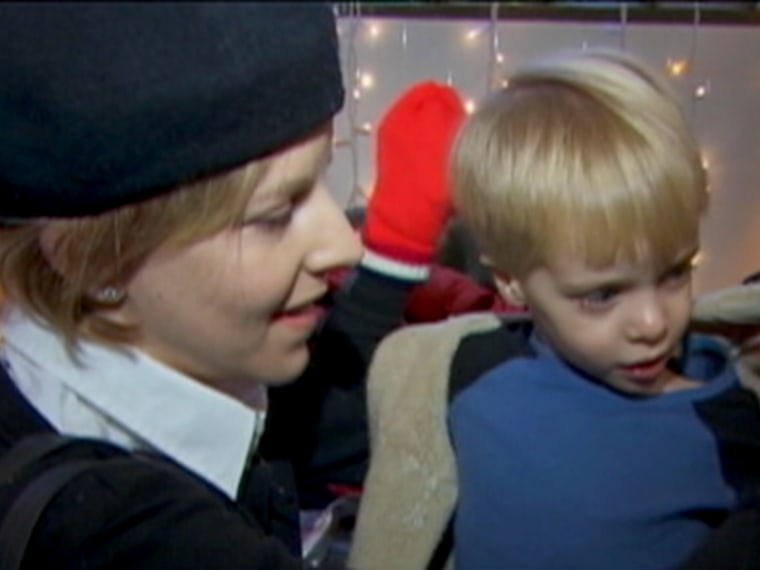I happen to live in a New York City neighborhood that’s home to a number of French families. And I’ve always wanted to know how the Parisian moms manage to look so disturbingly chic at preschool drop-off. How do they get their kids to eat pumpkin soup and gourmet cheeses, while mine is stuffing goldfish down his gullet?
So I eagerly read last year's best-seller, “Bringing Up Bébé: One American Mother Discovers The Wisdom of French Parenting.” Journalist Pamela Druckerman wrote about the benefits of French-style parenting, based on her experience birthing and raising three young children in Paris, and struck a real chord with U.S. mothers tired of 2 a.m. feedings and screaming toddlers — not to mention that post-baby dry spell in the boudoir.
Now, Druckerman is back with a new child-rearing guide. "Bébé Day By Day: 100 Keys To French Parenting" distills the lessons of her memoir into 100 fairly direct rules about how to live the French way.
Take my favorite, rule #29 (which I plan to institute immediately): You Are the Keeper of the Fridge. In France, Druckerman says, kids don’t have the right to rummage for food whenever they want. They have to ask an adult, cutting down on pre-meal munchies and constant chaos in the kitchen.
But are French moms equally enthralled with French parenting?
Yes and no, says Dominique Misrahi, a French mom of 3-and-half year old twins, Ethan and Noah, who’s lived in the US since 1999, and owns a Pilates and fitness center, DLFit, with her French husband.
Misrahi hasn’t read either of Druckerman’s books. But she says the big difference between French and American mothers is that French moms make it a priority to have an active social or professional life (preferably both) outside of their children. Mothers in the U.S., she explains, often put their kids’ social calendar, development and general well-being before themselves, to a fault, 100 percent of the time.
“French mothers don’t rely as much on parenting books,” says Misrahi. “We use more of our parenting instincts to guide us. In some cases, you really just have to do what you feel as a parent.”
At the same time, Misrahi loves the way so many American moms interact with their children.
“It’s just not the way we were raised in France,” she says. “Mothers here are generally more talkative, and patient, and explain much more about everything to their young children.” Beatrice Del Favero, a French mom raising two kids in Manhattan, admires how well American parents and teachers build up a child’s self-confidence.
“What I noticed about the American school system in particular,” she says, “is how good they are at helping children develop self-esteem and how they encourage kids to develop in non-academic areas too.”
Positive reinforcement seems to be a very American parenting trait.
“I think American moms are much more into making [their children] feel good about themselves,” says Stephanie Brown, “La Mom Paris,” an American mother and blogger living in the City of Lights with her French husband, 7-year-old son and 5-year-old daughter.
French moms aren’t always negative with their children, Brown clarifies, but American parents are better at communicating how proud they are of various milestones and accomplishments.
Renée Mindek, an International Baccalaureate French teacher, lives in a Philadelphia suburb with her four kids, ranging from 13 years to 18 months, and after considerable travel to France considers herself a “French aficionado.” She’s chosen to speak French exclusively to her new baby— a decision she chronicles on her website, Mommy du Jour.
One of the major distinctions between her American and French “mom friends”? U.S. mothers express much more affection to their children. And while lots of hugs might be misinterpreted as hovering or the dreaded “helicopter parenting,” Mindek believes some of her French friends are missing out on “personal closeness” she feels with her family.
Still, a little independence is healthy, says Liene Lucane, a Greenville, S.C. mother who just returned from three years in France with her two toddler boys, Lauris and Mikus.
Lucane, who blogs at Femme au Foyer, explains, “French mothers treat their children with the expectation that they will behave themselves appropriately.” And apparently, they do.
Whether a French mom living in the U.S. or an American in Paris, mothers are reluctant to say one style of parenting is better. But there’s no question, the cultural differences start from the beginning.
One example: Bebe Day by Day’s Rule #3: Don’t Panic About Sushi.
That’s right, expectant mamans. According to Druckerman's interpretation of more laid-back French parenting norms, a few California rolls at your regular sushi place isn’t cause for a nervous breakdown. Now if that’s French parenting, sign me up.
